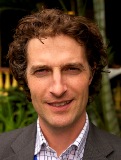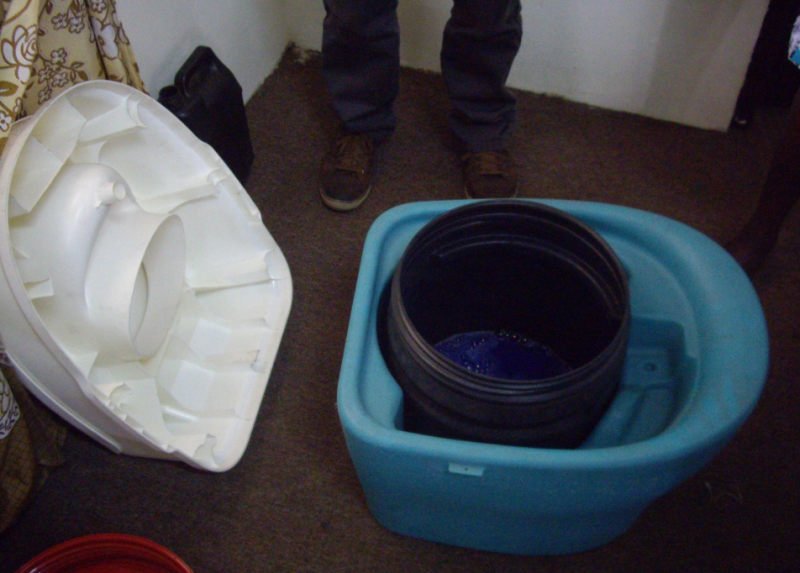- Sanitation systems
- Toilets without urine diversion
- Container-based, mobile or bag-based toilets
- Mobile toilet in Ghana (WSUP), the Clean Team (and faecal sludge management)
Mobile toilet in Ghana (WSUP), the Clean Team (and faecal sludge management)
36.2k views
Re: Mobile toilet in Ghana (WSUP), the Clean Team (and faecal sludge management)
wedc-knowledge.lboro.ac.uk/details.html?id=22229
www.nanomembranetoilet.org
Apply to study our MSc in Community Water and Sanitation:
www.cranfield.ac.uk/courses/masters/comm...-and-sanitation.html
Please Log in to join the conversation.
You need to login to reply- Elisabeth
-
Topic Author
- User is blocked
- Freelance consultant since 2012
Less- Posts: 3372
- Karma: 54
- Likes received: 932
Re: Mobile toilet in Ghana (WSUP), the Clean Team (and faecal sludge management)
About Alison's point: you are right that "having resource recovery doesn't define a sucessful, scalable system". But I would say it the other way around: "if you don't have resource recovery then it is even harder to turn it into a successful, scalable system that recovers at least part of the operating costs".
This is precisely the reason why Sanergy, SOIL and now also eEthekwini are looking at ways to generate a product (or even several) from their sanitation system that can be sold:
- Sanergy: forum.susana.org/forum/categories/170-pu...rgy-in-nairobi-kenya
- SOIL: forum.susana.org/forum/categories/17-fer...icultural-activities
- eThekwini: forum.susana.org/forum/categories/147-pr...ipality-south-africa
- Lesson 2: Overcoming the scaling paradox needs to build better capabilities for replication, growth, and improvements (How can we better replicate, grow, and improve sanitation businesses?)
- Lesson 3: Overcome the scaling paradox requires capabilities to manage increasingly complex business models (How can we manage complex sanitation business models?)
See: Scaling-up sanitation businesses in low- and middle-income countries: Heiko Gebauer, Eawag, Duebendorf, Switzerland
www.susana.org/images/documents/07-cap-d...1-2-1-4Schoebitz.pdf
Video of the presentation:
They also held a workshop on the same topic, see presentations here:
www.susana.org/en/resources/conference-m...2/2015/262-fsm3-ws-2
Details of the workshop:
+++++++
Scaling-up sanitation businesses in low- and middle-income countries (Thursday 22 January, 09.00 – 17.00)
Organisations involved: re.source, Loowatt, WASAZA/BORDA, GOAL and Eawag
Lead organizer: Eawag
Names of workshop co-facilitators: Kory Russell (Re.Source), Virginia Gardiner (LOOWATT), Christopher Kellner (WASAZA/BORDA), Niall Boot (GOAL), Heiko Gebauer (Eawag)
The workshop considers sanitation as a business. In the workshop, we discuss various aspects for optimizing sanitation businesses. We discuss cartidge-based systems, transfer stations, and decentralized treatment options. We develop business scenarios for moving from a pilot study to a city scale implementation. The workshop will be interactive and we want participants to contribute actively to the discussion.
++++++++
Regards,
Elisabeth
Freelance consultant on environmental and climate projects
Please Log in to join the conversation.
You need to login to reply- Elisabeth
-
Topic Author
- User is blocked
- Freelance consultant since 2012
Less- Posts: 3372
- Karma: 54
- Likes received: 932
Re: Mobile toilet in Ghana (WSUP), the Clean Team (and faecal sludge management)
Thanks for your post, it is great to hear from you directly and to get these clarifications. As you can see in this thread in previous posts, we have discussed the blue liquid that Clean Team was using in Ghana at quite some length in the past. Therefore, I am not that surprised, but happy to hear, that your results have shown it to be not the right way forward. This splashing issue was also something that I had wondered about. When I spoke to Alison about the blue liquid in January in Hanoi and when I wrote my post a couple of days ago, I didn't know yet that the blue liquid had been abandoned.
My statement about the difficulty of scaling up was partly based on the issue with the blue liquid (for me it just seemed like an additional operating expense which made the treatment process downstream harder and destroyed any option for resource recovery that should normally exist with these container-based solutions, or cartridge-based solutions as they appear to be called as now).
The other reason why I stated that there could be difficulties with scaling up are not specific to your project but apply to all projects that use such container-based solutions and that are NGO-led with philantrophic funds. I think all the other really interesting pilot projects, be it SOIL in Haiti, Sanergy in Kenya, X-runner in Peru, MoSan in Kenya (and I do admire all of them!), have a major problem for scaling up ahead of them.
One structural problem I see is the lack of local government involvement, as well as the difficulty to "wean people off" getting a free or highly subsidised service to a service where they have to pay or pay more (this of course opens up the whole discussion about subsidies).
I have written about that here in this thread called "Where is the local government involvement in faecal sludge management and sanitation for the urban poor?": forum.susana.org/forum/categories/142-up...n-for-the-urban-poor
it was also raised again recently in this thread:
"Overview on service models or fecal sludge emptying and treatment for dense urban areas …….wanted"
forum.susana.org/forum/categories/53-fae...e-urban-areas-wanted
So my scepticism was not specifically directed at your project only but towards the general approach of such container-based solutions led by NGOs. I hope you don't feel offended as this was not at all my intention.
The other way of looking at this argument is this: If the local government is failing its people (for various reasons), and if I have philantrophic money available to do something then even providing a service to just 100, 1000 or even 5000 people is already a good thing, helping at least these people. Even a single child's death from diarrhoea prevented is surely a good thing. So even if a project didn't have the potential to scale up, it could still be a very worthwhile project.
I have some more thoughts about scaling-up but I will put them in a separate thread in case we decide to move this part of the discussion - which is not specific to the Clean Team project in Ghana - to a new thread.
You have probably developed some strategies on how you want to scale this up in Ghana. I would be very interested to hear about your strategies if you are happy to share them.
Regards,
Elisabeth
P.S. Alison: I am planning to attend the WEDC conference in July in the UK, so I will make sure that I will attend your presentation again ("oh no!" I hear you say
Freelance consultant on environmental and climate projects
Please Log in to join the conversation.
You need to login to replyRe: Mobile toilet in Ghana (WSUP), the Clean Team (and faecal sludge management)
I would totally agree with Andy and disagree with Elisabeth on the potential for scale up. One specific point is the potential for resource recovery. Actually with the Sistema Biobolsa system we will generate and collect biogas. We are also looking into another way to recover ammonia form the waste.
I also don't think that having resource recovery defines a successful, scalable system. But that is a debate for another thread, I think!
A couple of points of information. Since the presentation in Hanoi we have decided not to move forwards with the Biofil trials. We are looking for another technology to treat the sludge that will be generated by the Biorock system, and considering using the modified drying beds that Chris Rose also presented at FSM3 :
I was also delighted to learn that we have a paper accepted at the WEDC Conference in July on this topic so any interested parties can hear an update then! Although of course feel free to ask any questions about the research in the meantime.
www.nanomembranetoilet.org
Apply to study our MSc in Community Water and Sanitation:
www.cranfield.ac.uk/courses/masters/comm...-and-sanitation.html
Please Log in to join the conversation.
You need to login to reply- ajnarracott
-

- Water and sanitation consultant with interest in:- on-site sanitation, business models, scale, utility water and sanitation services, utility strengthening, economic regulation, social enterprise, corporate social innovation, knowledge management, learning and dissemination of ideas, insights and learnings.
Re: Mobile toilet in Ghana (WSUP), the Clean Team (and faecal sludge management)
Thanks for sharing. I wanted to add a few things:
- The blue toilet additive was what we started with to deliver an exception toilet experience that people would want to pay for. After months of using it and collecting and analysing various data (cost to import, health and safety implications, price elasticity of service, treatment limitations, etc, etc.) it looks like the chemical won't work long term. Clean Team has been doing various trials with existing customers of a dry toilet (with sawdust) and the feedback is positive. Interestingly customers don't like the 'splash back' that the chemical toilet gives, especially for Muslims who have to have a full wash afterwards before prayers.
- urine is collected in a bottle by the user and disposed of in the drain along with grey water, or goes straight out into the drain with wash water
- This is work in progress so please refrain from casting judgement on whether this will 'scale up'. Its a continual process of trial and iteration with philanthropic funds within a reasonable time frame to arrive at a financially sustainable model.
Please Log in to join the conversation.
You need to login to reply- Elisabeth
-
Topic Author
- User is blocked
- Freelance consultant since 2012
Less- Posts: 3372
- Karma: 54
- Likes received: 932
Re: Mobile toilet in Ghana (WSUP), the Clean Team (and faecal sludge management)
Her presentation was entitled:
Testing Decentralised Treatment Solutions for Portable Home Toilet Waste in Kumasi, Ghana: Alison Parker, Cranfield Water Science Institute, Cranfield University, Cranfield, United Kingdom
www.susana.org/images/documents/07-cap-d...2/2-2-3-1aParker.pdf
(I also attach it below)
I attended the presentation and here are some key points from it:
They are going to pilot three different treatment methods for dealing with the mixture of faeces and blue liquid (and toilet paper, I think?):
++++++++++
- Sistema Biobolsa: 100L/day → 1000L/day Clean Team waste
- Biorock: 50L/day Clean Team waste → 2 day retention time (standard for a septic tank)
- Biofil: receiving sludge from Biorock
• Liquid and solid samples collected daily and tested for:
– pH
– Alkalinity
– ammonia concentration
– Chemical Oxygen Demand
– Temperature
– Turbidity
– presence of blue dye in final effluents (using a spectrophotometer)
+++++++
The pilot plants are currently being installed, expect results later in the year.
About the blue liquid which we had discussed quite a bit in this thread previously:
This is what it looks like (photo from her presentation):
It is a biocide and is meant to kill pathogens in the toilet (to some extent) and also reduce/mask any odours.
Apparently the customers like the blue liquid very much and are basically "demanding" it now - one couldn't get away with a mobile toilet without one in Ghana (Kumasi), we were told.
Whilst it is a biocide it is meant to be biodegradable. How it will behave in the biological treatment units that will be tested is anyone's guess. Hopefully it would not inhibit the process too much.
I am actually not too sure what happens to the urine. It is diverted if I understood right but not collected but infiltrated - right?
Please correct me if I got anything wrong.
Personally, I have the feeling that this system will not be easily scaled up and that it will remain something that works (only) when there is considerable NGO support and external funding. Due to the blue liquid, I see very little to no scope for resource recovery in a meaningful way.
Am happy to be proven wrong of course.
Regards,
Elisabeth
Freelance consultant on environmental and climate projects
Attachments:
-
 blueliquid.png
(Filesize: 748KB)
blueliquid.png
(Filesize: 748KB)
Please Log in to join the conversation.
You need to login to replyRe: Mobile toilet in Ghana (WSUP), the Clean Team (and faecal sludge management)
www.wsup.com/2014/05/12/the-kumasi-smell...rt-and-installation/
www.nanomembranetoilet.org
Apply to study our MSc in Community Water and Sanitation:
www.cranfield.ac.uk/courses/masters/comm...-and-sanitation.html
Please Log in to join the conversation.
You need to login to replyRe: Mobile toilet in Ghana (WSUP), the Clean Team (and faecal sludge management)
A couple of things to clarify - I don't work for or represent Clean Team. However, Cranfield University has been contracted by WSUP (who were involved in founding Clean Team) to investigate options for treating Clean Team's waste. There should be a blog post about this research appearing on the WSUP website soon.
We'll start our field trials in July (hopefully) so after that we'll have an idea about how biological systems handle the "blue liquid".
We're not responsible for any changes to the "blue liquid" but I'll point the relevant staff in Clean Team to this thread to read your suggestions.
Alison
www.nanomembranetoilet.org
Apply to study our MSc in Community Water and Sanitation:
www.cranfield.ac.uk/courses/masters/comm...-and-sanitation.html
Please Log in to join the conversation.
You need to login to reply- Kevinkuhn
-
 Less
Less- Posts: 30
- Karma: 6
- Likes received: 17
Re: Mobile toilet in Ghana (WSUP), the Clean Team (and faecal sludge management)
I am not quite sure why you assumed that they might use domestos, because there are way better sanitizing liquids on the market, which don´t harm biological WW treatment.
For example, Aqua Kem Green, www.thetford-europe.com/product/aqua-kem-green/ . This is the most commonly used liquid for camping toilets.
However, this product could be considered as 'green liquid' and is obviously not the one used by Clean Team. The same company also supplies a 'blue liquid' which does´t have such good properties regarding the biological decomposition of fecal matter.
I am still curious to find out if the biological treatment system for the Clean Team project can handle the blue liquid and which one you use exactly. Maybe, you Alison, could have a look on such 'green liquid' and might consider it as an opportunity for your systems? In this scenario it would also be interesting to see, if that would raise costs for purchasing the liquid and how the user reactions are compared to the blue liquid.
@Alison, thanks for answering my earlier questions, I am looking forward to get an idea if such green liquid would be an option for Clean Teams treatment system?
Thanks,
Kevin.
www.nonwatersanitation.de
www.nonwatersanitation.org (english)
EcoToiletten - Rental for public composting toilets for cities and music festivals in Germany
www.ecotoiletten.de
Please Log in to join the conversation.
You need to login to replyIt's not domestos! As you say that would be inappropriate!
Alison
www.nanomembranetoilet.org
Apply to study our MSc in Community Water and Sanitation:
www.cranfield.ac.uk/courses/masters/comm...-and-sanitation.html
Please Log in to join the conversation.
You need to login to reply- ben
-

- Water and sanitation engineer
Less- Posts: 107
- Karma: 11
- Likes received: 57
I just wanted to ask you an extra question.
From an outside point of view, and please correct me if I'm wrong, it seems that the "blue liquid" you're using might be close to DOMESTOS, maybe diluted, one of the frontline product sold by Unilever, partner and funder of the ghanasan clean team project.
If this is so, then I invite you to check what this product is made of :
www.astleys.co.uk/acatalog/58043-5_Domestos_Regular_Bleach.pdf
Amines,C12 – 18 – alkyldimethyl, N-oxides / Sodium Hydroxide (OES) / Sodium hypochlorit.
The informations we find in this paper :
DISPOSAL CONSIDERATIONS
Small quantities: Wear suitable gloves and eye/face protection. Dilute with water to at least 5% w/v (50 g/litre) and pour down a wastewater drain (foul sewer).
Large quantities: contact a licensed waste management company. Dispose of according to local authority regulations
European waste catalogue 20 01 29 : Detergents containing dangerous substances
Very toxic to aquatic organisms
I checked but not a single product from DOMESTOS seems ecological.
My question is, if DOMESTOS (and again tell me if this is not the product we're talking about) has been sold since 1961 by unilever, can you confirm that Unilever can't actually help you for the downstream treatment of this product, that they never though about ?
I hope I'm wrong, and that Unilever is actually fighting for sustainability, as said :
www.domestos.co.uk/sustainable-cleaning/
www.unileverghana.com/sustainable-living...ainable-living-plan/
Good luck in treating it Alison, and thanks for keeping us updated.
Ben
Please Log in to join the conversation.
You need to login to replymuench wrote: For his Question 2 my guess would be that since it is still a bit of a "pilot", it may not be worth the hassle of producing these toilets locally but that this is probably the long-term goal. Although, mind you, perhaps we are too "hung up" about local production of things - mobile phones are also not produced locally but successful all over the world... Maybe with some types of (plastic) toilets, the same will be true in the end? Just guessing.
This is definitely outside my area of expertise, but I'm not sure there is currently the manufacturing capacity in Ghana? This was the impression i got when visiting a septic tank manufacturer in Accra recently.
muench wrote: For Kevin's third question, I am also curious - but maybe there is just no market for these fertilisers from excreta, perhaps the soils in Kumasi, Ghana are so fertile as it is (that one one arguments I heard from Uganda why reuse is not a big deal there in the Kampala region at least). Correct me if I am wrong.
Sorry, I missed this bit in my last post. At the moment we are focused on treating the waste so it can be discharged safely without causing a health hazard. This has to be a priority! Then maybe we'll get the chance to look at reuse of nutrients in a subsequent project. Cranfield have a student looking at down-flow adsorption filters for AD effluent and Duke University are developing something similar. But both systems are still under development so couldn't be used in our upcoming trial.
muench wrote: There is one thing, however, that I still don't get. And that is the blue liquid. We spoke about this kind of liquid in another thread on composting, see e.g. the post by Wolfang Berger here:
forum.susana.org/forum/categories/70-com...gemobile-toilet#7344).
See also here for one example of such a liquid for mobile toilets: www.safetfresh.co.uk/products/stf/ - I am not saying this is the one being used by Clean Team.
I understand it is needed in the Clean Team Toilets in order to control odour in the faeces bucket (even though urine is diverted away and collected separately).
See also this blog post from Gavin Collins about visiting Clean Team in Accra:
microbialecophysiology.com/2014/04/12/vi...to-clean-team-ghana/
Photos that he posted in his Twitter account:
Invalid consumer key/secret in configuration
Invalid consumer key/secret in configuration
So my question is, why is the blue liquid required for odour control for this type of toilet whereas it is not for other, similar mobile urine diversion toilets, such as:
Photo of mobile UD toilet from SOIL's website:
- SOIL Haiti (www.oursoil.org)
- MoSan (forum.susana.org/forum/categories/52-mob...n-mosan-now-in-kenya)
- X-runner (forum.susana.org/forum/categories/52-mob...iloting-in-lima-peru)
Invalid consumer key/secret in configuration
I can think of the following possible reasons (just guessing!):Are any of these possible reasons the actual reason?
- The customers in Kumasi, Ghana, are more sensitive to smell and are less willing to put up with any smell.
- The faeces bucket is emptied less frequently in the Clean Team model than in the other models I mentioned above.
- The customers in Kumasi are less diligent and there is more urine going into the faeces bucket than it should.
- The blue liquid is not only for odour control but also for aesthetic reasons because the customers prefer to view a blue liquid when they sit down to defecate, rather than their faeces from the time before.
- The blue liquid gives the toilet a "modern", Western feeling.
Again, this is really down to Clean Team to respond but I would say from my recent visit reason 4 is the closest. The Clean Team toilet has a very simple design, there is no "trapdoor" or anything else in their toilet. So the dark blue liquid means the user does not see the waste, and it also masks the smell. The latter is very important as many customers have the toilets in their homes, even in their bedrooms!
www.nanomembranetoilet.org
Apply to study our MSc in Community Water and Sanitation:
www.cranfield.ac.uk/courses/masters/comm...-and-sanitation.html
Please Log in to join the conversation.
You need to login to reply- Sanitation systems
- Toilets without urine diversion
- Container-based, mobile or bag-based toilets
- Mobile toilet in Ghana (WSUP), the Clean Team (and faecal sludge management)







